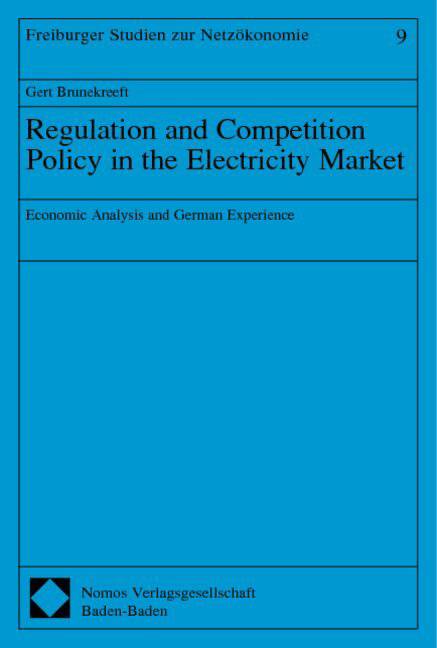
Door een staking bij bpost kan je online bestelling op dit moment iets langer onderweg zijn dan voorzien. Dringend iets nodig? Onze winkels ontvangen jou met open armen!
- Afhalen na 1 uur in een winkel met voorraad
- Gratis thuislevering in België vanaf € 30
- Ruim aanbod met 7 miljoen producten
Door een staking bij bpost kan je online bestelling op dit moment iets langer onderweg zijn dan voorzien. Dringend iets nodig? Onze winkels ontvangen jou met open armen!
- Afhalen na 1 uur in een winkel met voorraad
- Gratis thuislevering in België vanaf € 30
- Ruim aanbod met 7 miljoen producten
Zoeken
Regulation and Competition Policy in the Electricity Market
Economic Analysis and German Experience
Gert Brunekreeft
€ 54,95
+ 109 punten
Omschrijving
In contrast to other European member states, Germany chose to refrain from regulating the monopoly parts in the electricity market at liberalization in 1998 and instead to strengthen the role for competition policy. Using law and economics, this study analyses this institutionally exceptional situation theoretically and empirically. Reflecting the relevant aspects of an electricity industry, the theoretical part relies on the theory of vertical relations and regulatory economics. The empirical part contrasts the developments in Germany with New Zealand, the United Kingdom and the Netherlands. In both the first two, competition policy was dominant, although decisively different. The analysis concludes that the lack of regulation in an electricity market is institutionally unstable. Not surprisingly, under pressure of the European Commission a regulator for the German electricity industry will have to take up its duties in July 2004, providing the issue with a highly topical dimension. This book is the author's Habilitation-thesis and aims in first instance at an academic audience, but is relevant and readily accessible for policy-makers, regulators and consultants as well.
Specificaties
Betrokkenen
- Auteur(s):
- Uitgeverij:
Inhoud
- Aantal bladzijden:
- 260
- Taal:
- Duits
- Reeks:
- Reeksnummer:
- nr. 9
Eigenschappen
- Productcode (EAN):
- 9783832903183
- Uitvoering:
- Paperback
- Afmetingen:
- 227
- Gewicht:
- 378 g

Alleen bij Standaard Boekhandel
+ 109 punten op je klantenkaart van Standaard Boekhandel
Beoordelingen
We publiceren alleen reviews die voldoen aan de voorwaarden voor reviews. Bekijk onze voorwaarden voor reviews.











